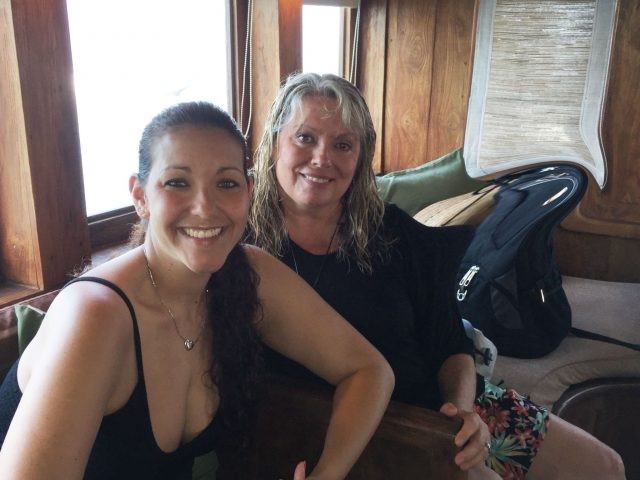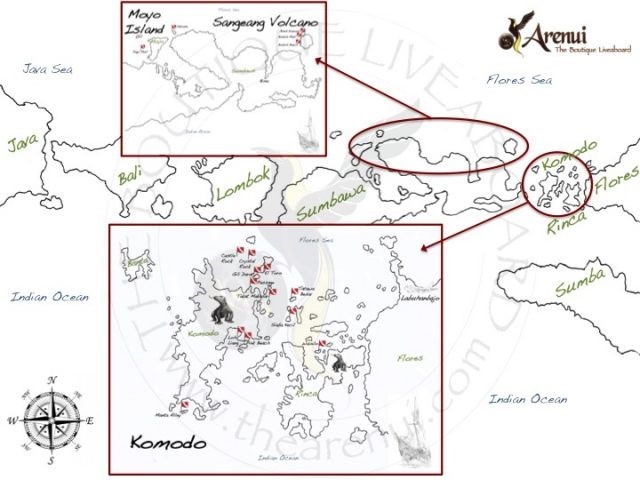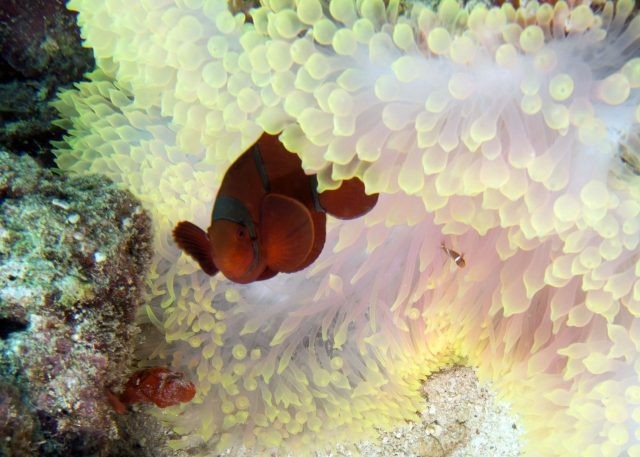News
An Epic Dive Trip to Komodo
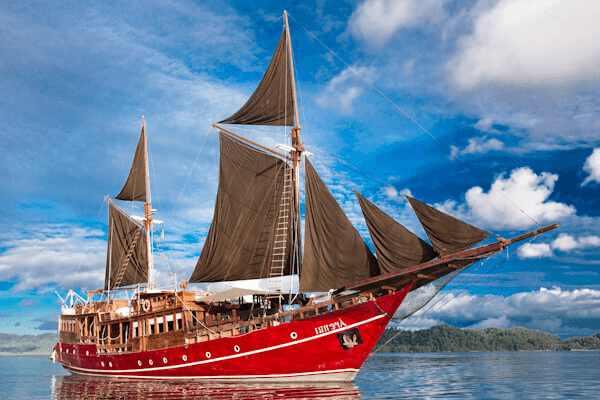
Having always dreamed of diving in Indonesia, I booked a trip to Komodo over a year ago. I decided to go with the Arenui because it was sponsoring a Ray of Hope Expedition (Marine Megafauna Foundation) and Dr Andrea Marshall, aka Queen of Mantas, was on board as the resident expert. As many of my readers know, I have been on several trips with Ray of Hope, doing Citizen Science Volunteer work, and I love the Foundation’s mission to save marine megafauna from extinction.
Andrea and I shared a room… and what a room! The Arenui is absolutely luxurious. The stateroom was large and roomy and so Indonesian! We stayed in Garuda, the stateroom named for the Hindu deity Garuda, a large humanlike bird who served as Vishnu’s mount. The carvings in the room were beautiful, as you can see! The Arenui is definitely the most luxurious boat I have been on, and I am now absolutely spoiled.
The mission of the trip was to identify as many Reef Mantas as possible. Of course, along the way we would dive several other dive sites too. The diving was out of this world and eclipsed my imagination. The trip map below shows our journey from Bali, past Lombok and Sumbawa to Moyo Island and the Sangeang Volcano, to Komodo and Rinca Islands in the Flores Sea. It was an incredibly beautiful journey, both above and below the surface.
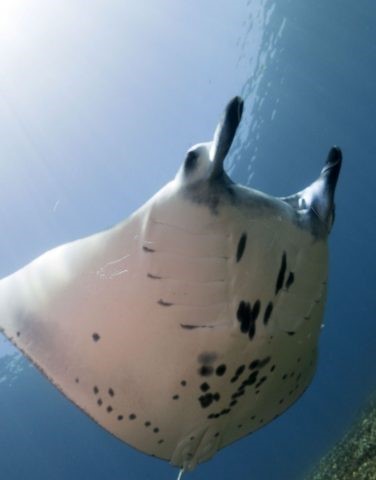
A Manta ID shot I took. Mantas are identified by the spots on their bellies…they are unique to each individual.
Why do I travel with Ray of Hope Expeditions? Because I admire their work, passion, and dedication. Andrea Marshall was the first person to do a PhD on Manta Rays. Until her research, very little was known about them. She discovered two species, and a large population off the coast of Mozambique, where she makes her home. She has advocated for protection for Mantas everywhere in the world. Indonesia, once the main fishery for Manta Rays for Chinese medicine, is now protecting Manta Rays as they have realized they are worth more for their economy alive than dead. Sadly, the once flourishing colony of Reef Mantas off Mozambique has declined by 95% due to Mozambique’s refusal to protect the animals. Manta encounters drew many to Mozambique’s dive centers, and the disappearance of the mantas will have a negative effect on Mozambique’s economy. Andrea has witnessed the decline of mantas in Mozambique over the last 12 years, and it has been heartbreaking. The species is very vulnerable to extinction because of the slow reproduction of the animals. Females give birth every 2 or 3 years to only one pup; rarely there are twins.
Fishing Mantas can destroy entire populations because they are taken faster than they can reproduce. These gentle, intelligent ocean giants must be protected in order to save the species from extinction. Andrea devotes her life to advocating for Manta Rays and other pelagics such as Whale Sharks, Mola Mola, and turtles.
Our first stop was Moyo Island and Angel Reef. I have to say that Angel Reef was heavenly, indeed! My first Komodo dive…and how gorgeous it was!
Diving Indonesia was an unbelievable experience for me. The sheer amount of life in the seas is almost mind blowing. Stay tuned for photos and reports on this fabulous journey. I will be posting frequently to show you the wonders of Komodo (yes, there will be dragons!).
For more from Tam, visit www.travelswithtam.com.
Gear News
Introducing the TR-80, IR-50 and CS-30 Regulators from DYNAMICNORD

Whether you are a beginner or a professional diver – with the three new main regulators from DYNAMICNORD, everyone will find their favourite regulator. They all look super stylish.
Excellent performance with the TR-80
Quality and performance are the be-all and end-all for regulators. It is not for nothing that the TR stands for Tec Reg. The innovative design of the TR-80 guarantees absolute reliability – even in ice-cold waters.

Perfect breathing effort at 0.8 J/l / certified for diving in waters below 10 degrees / structural design made of solid brass for best cold protection / membrane-compensated design with dry seal of the first stage / reduced exhalation effort thanks to optimized exhalation membrane and bubble deflector / adjustable Venturi (dive/predive) and adjustment knob for individual inhalation comfort / innovative design of the front cover prevents free-flow in strong currents or when diving with scooters / design made of sandblasted brass, matt chrome finish / 2 HP and 4 LP outlets / mouthpiece made of high-quality, anti-allergic silicone for maximum comfort.


Amazing underwater adventures with the IR-50
The IR-50 is the top regulator for advanced and experienced divers. Natural breathing is the essence of this regulator.

Ideal breathing effort at 0.8 J/l /certified for diving in waters below 10 degrees / compensated membrane / adjustable venturi (dive/predive) and adjustment knob for individual inhalation comfort/ outlet valve and deflector for minimum exhalation effort and reduction of bubbles on the face / design made of sandblasted brass, matt chrome finish / 2 HP and 4 NP outlets / mouthpiece made of high-quality, anti-allergic silicone for maximum comfort.


The Workhorse – our CS-30
For diving centres and diving beginners – the workhorse stands for strong construction, reliability and robustness. Perfect for your training.

Optimal breathing effort at 0.8 J/l /recommended for diving in waters above 10 degrees / non-compensated piston / adjustable venturi (dive/predive) / outlet valve and deflector for minimum exhalation effort and reduction of bubbles on the face / design made of sandblasted brass, matt chrome finish / 1 HP and 3 NP outlets / mouthpiece made of high-quality, anti-allergic silicone for maximum comfort.


Octopus OP-30
The OP-30 is the ideal addition to all DYNAMICNORD regulators. It is identical in construction to the CS-30.

The TR-80, IR-50, CS-30 (DIN & INT) regulators and the Octopus OP-30 are available from DYNAMICNORD dealers and in the online store.
DYNAMICNORD – Your Outdoor Companion.
Marine Life & Conservation
Paul Watson Released as Denmark Blocks Japan’s Extradition Bid

Renowned anti-whaling activist Paul Watson has been released from custody in Greenland after spending five months in detention. Denmark’s Justice Ministry rejected Japan’s request for his extradition, citing insufficient guarantees that his time already served in custody would be credited against any potential sentence.
The 74-year-old Canadian-American was arrested on July 21 in Nuuk, Greenland’s capital, when his ship docked to refuel. His arrest was based on a 2012 Japanese warrant related to a 2010 encounter in Antarctic waters. Japan alleged Watson obstructed operations and caused damage to a whaling research ship during efforts to disrupt illegal whaling. Watson has consistently denied these claims, maintaining his commitment to marine conservation.
Denmark, which oversees extradition matters for Greenland, concluded that while the legal conditions for extradition were met, the lack of assurances from Japan regarding time-served credit made extradition untenable.
In a video shared by his foundation, Watson expressed gratitude and relief, saying, “After five months, it’s good to be out… and good to know they’re not sending me to Japan.” He added that the most difficult part of his time in custody was being separated from his two young sons.
Watson is a pioneering figure in marine conservation, known for founding the Captain Paul Watson Foundation in 2022 after decades of activism with the Sea Shepherd Conservation Society. His bold efforts to defend marine life have earned him widespread support, including from celebrities and conservationists. His work has also been featured in the acclaimed reality TV series Whale Wars.
Watson’s lawyer, Jonas Christoffersen, praised the decision, stating, “We are happy and relieved that Paul Watson is now free.” He added that Watson is eager to reunite with his family and continue his vital work.
The arrest occurred while Watson’s vessel, the M/Y John Paul DeJoria, was en route to the North Pacific with a team of 26 volunteers to intercept a Japanese whaling ship. His foundation described the arrest as politically motivated and emphasized that Watson’s actions were focused on ending illegal whaling practices.
Japan resumed commercial whaling in 2019 after leaving the International Whaling Commission, asserting that whale meat is a cultural tradition. Conservationists, however, continue to challenge these practices, highlighting their impact on marine ecosystems.
Despite the challenges, Watson remains steadfast in his mission to protect marine life and bring attention to whaling practices. His dedication to ocean conservation has made him a globally respected advocate for the environment.
-

 News2 months ago
News2 months agoIconic SS United States to become the World’s Largest Artificial Reef
-

 News3 months ago
News3 months agoBook Review – 52 Assignments: Underwater Photography
-

 Gear News3 months ago
Gear News3 months agoDYNAMICNORD – New German diving brand enters the British market
-

 News3 months ago
News3 months agoExploring Cenote El Pit: A Diver’s Dream
-

 Gear News3 months ago
Gear News3 months agoTry BARE drysuits (and maybe even win one!) this Friday with Sea & Sea at North West Dive Fest
-

 Marine Life & Conservation3 months ago
Marine Life & Conservation3 months agoBook Review: Coral Triangle Cameos
-

 Blogs2 months ago
Blogs2 months agoDive the Egyptian Red Sea this Autumn with Regaldive
-

 News3 months ago
News3 months ago2024 Ocean Art Underwater Photo Competition Announced


